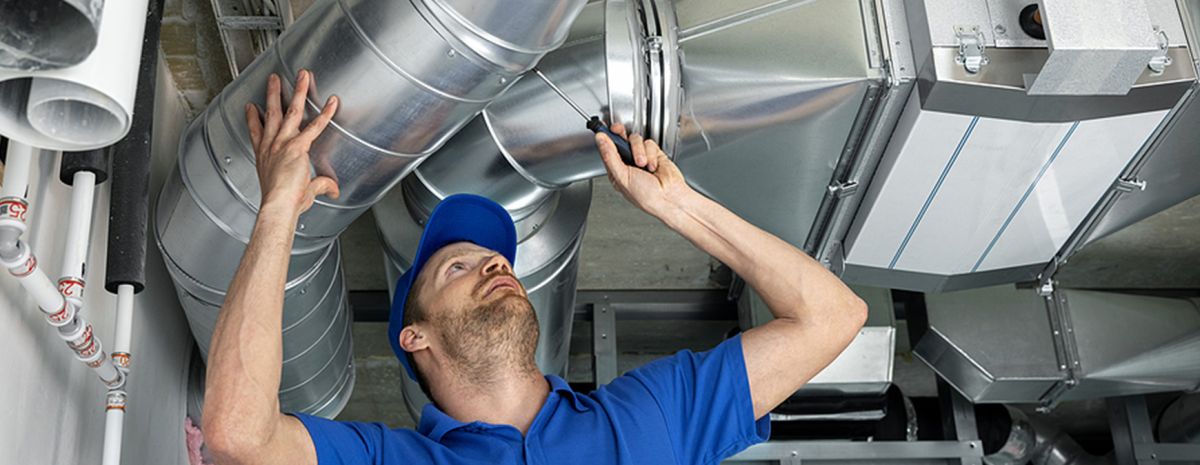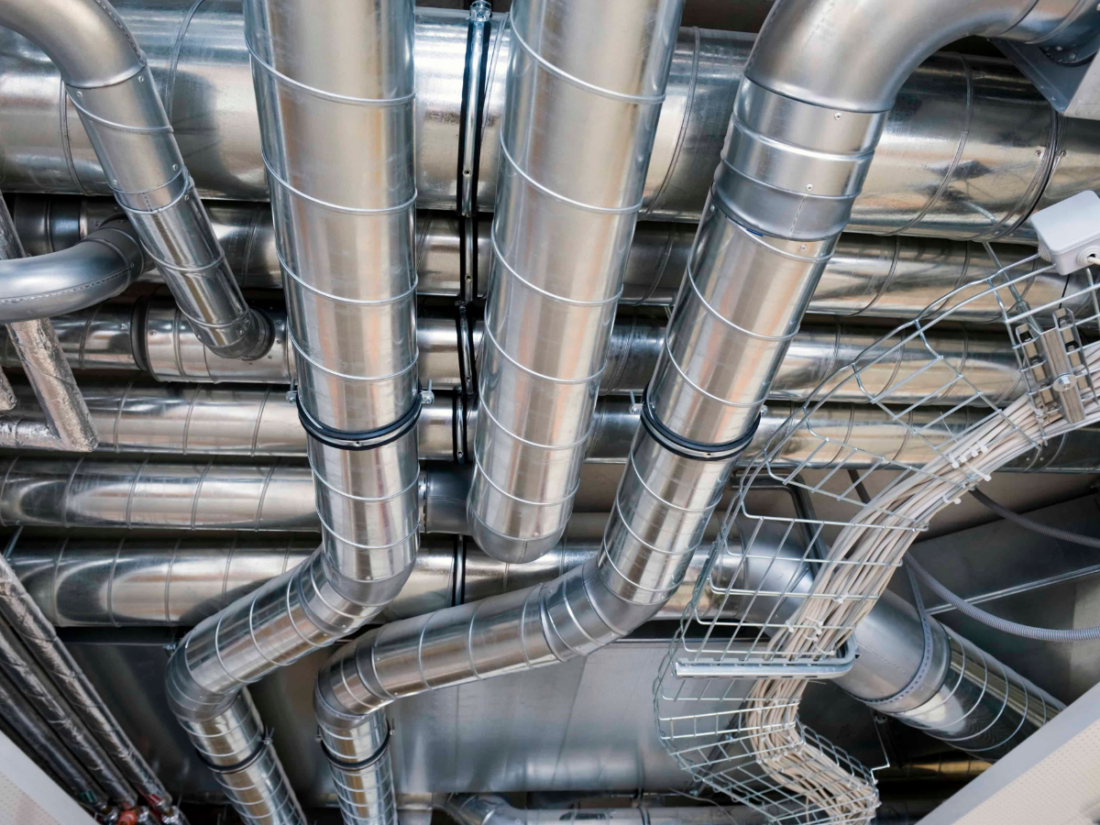Checking Out the Vital Parts of an Efficient HVAC System
An efficient heating and cooling system is constructed on a number of critical components that operate in consistency. Each part, from the thermostat to the ductwork, plays a necessary duty in maintaining convenience and power efficiency. Comprehending these components is critical for maximizing performance and improving interior air high quality. As one checks out these elements, the elaborate connections in between them expose understandings right into boosting total system effectiveness. What specific factors contribute most to this performance?
The Role of the Thermostat in HVAC Efficiency

Typically forgotten, the thermostat plays an essential function in the efficiency of HVAC systems. This little tool functions as the main control center, regulating temperature setups and ensuring perfect comfort within an area. By precisely noticing the ambient temperature level, the thermostat connects with the air, air flow, and home heating conditioning units to preserve the wanted environment
An effective thermostat decreases energy consumption by triggering the HVAC system just when needed, consequently stopping excessive home heating or air conditioning. Modern wise and programmable thermostats boost this performance additionally by permitting customers to establish timetables and from another location adjust setups, adjusting to daily routines.
The positioning of the thermostat is essential; inappropriate location can lead to unreliable temperature level readings, resulting in inefficient procedure. In general, a well-functioning thermostat not only enhances comfort but likewise adds noticeably to energy financial savings and the durability of the HVAC system.
Understanding the Significance of Air Filters
Air filters offer a vital function in HVAC systems by ensuring that the air distributing within a room remains clean and healthy. These filters catch dust, allergens, and various other pollutants, avoiding them from being recirculated throughout the environment. By catching these fragments, air filters add to enhanced indoor air top quality, which can considerably benefit residents' health, specifically those with allergies or breathing conditions.
In addition, maintaining clean air filters improves the effectiveness of HVAC systems. Clogged up filters can restrict air flow, creating the system to function more challenging to keep desired temperature levels, resulting in boosted power consumption and greater utility bills. On a regular basis replacing or cleaning filters is an important upkeep step that can lengthen the lifespan of HVAC devices. Inevitably, understanding the significance of air filters allows house owners and building supervisors to take aggressive procedures to ensure a well-functioning, reliable heating and cooling system that advertises a comfy and safe interior environment.

The Functionality of the Heating System and Heatpump
Furnaces and warm pumps are critical parts of a/c systems, responsible for providing warmth throughout chillier months. Heaters run by home heating air with burning or electrical resistance, then distributing it throughout the home by means of ducts. They commonly use fast heating and can be fueled by gas, power, or oil, depending upon the system kind.
Alternatively, warmth pumps transfer warmth as opposed to produce it. They draw out heat from the outdoors air or ground, even in low temperatures, and transfer it inside your home. HVAC experts. This twin functionality allows heatpump to additionally offer cooling in warmer months, making them versatile choices for year-round climate control
Both systems call for appropriate maintenance to ensure performance and longevity. While heating systems stand out in severe cool, heat pumps can be advantageous in moderate climates. Recognizing their unique functionalities help property owners in picking one of the most appropriate option for their home heating needs.
Checking Out the A/c System
The air conditioning system is an essential part of a/c systems, readily available in various types to suit different needs. Understanding the efficiency rankings of these units is vital for making educated selections about energy intake and price. This area will check out the diverse sorts of ac system and clear up exactly how efficiency scores influence efficiency.
Kinds of Air Conditioners
While different elements influence the choice of air conditioning systems, recognizing the various kinds readily available is critical for home owners and building managers alike. Central air conditioning conditioners are developed to cool whole homes or structures, making use of a network of ducts for air movement. Window devices offer an even more local solution, suitable for little rooms or solitary rooms. Portable a/c unit offer adaptability, allowing individuals to relocate the system as needed. Ductless mini-split systems are an additional alternative, combining the performance of main systems with the benefit of zoning, as they call for no ductwork. Geothermal systems harness the earth's temperature for energy-efficient cooling. Each kind comes with unique benefits, making educated selections vital for reliable environment control.

Effectiveness Scores Explained
Comprehending efficiency rankings is important for selecting the right cooling system, as these metrics provide insight right into the system's performance and energy intake. The most typical score for ac unit is the Seasonal Power Efficiency Ratio (SEER), which determines the cooling result throughout a typical air conditioning period split by the overall electric energy input. A higher SEER suggests much better effectiveness. Additionally, the Power Performance Ratio (EER) is made use of for determining performance under details problems. One more essential metric is the Energy Celebrity qualification, which represents that a device fulfills stringent energy performance guidelines. By assessing these scores, consumers can make informed options that not just optimize convenience however likewise minimize power costs and ecological effect.
The Significance of Ductwork and Air movement
Effective ductwork style and air flow management play critical functions in the general efficiency and performance of heating and cooling systems. Appropriate ductwork warranties that conditioned air is distributed equally throughout a room, lessening temperature level changes and boosting comfort. Properly designed air ducts decrease resistance to air flow, decreasing the work on HVAC tools and inevitably reducing energy consumption.
Air flow administration involves tactically putting vents and signs up to improve the flow of air. This avoids common concerns such as warm or cool areas, which can take place when air movement is obstructed or improperly well balanced. In addition, the best duct materials and insulation can further enhance effectiveness by minimizing heat loss or gain throughout air transit.
An efficient ductwork system not just adds to power savings however can additionally lengthen the lifespan of cooling and heating equipment by lowering unnecessary stress (HVAC experts). Subsequently, recognizing the value of ductwork and airflow is crucial for accomplishing peak heating and cooling system performance
Regular Maintenance Practices to Improve Performance
Regular upkeep techniques are important for making sure peak efficiency of heating and cooling systems. These techniques include regular assessments, cleansing, and required repair services to maintain the system running effectively. Routinely transforming air filters is essential, as blocked filters can block air flow and reduce efficiency. Additionally, technicians need to inspect and clean evaporator and condenser coils to avoid getting too hot and power waste.
Yearly professional examinations are also suggested, as experienced technicians can identify possible issues before they intensify. Oiling relocating components minimizes wear and tear, adding to a much longer life expectancy for the system. Guaranteeing that the thermostat works correctly aids in maintaining excellent temperature control.
Often Asked Concerns
Exactly how Commonly Should I Replace My Thermostat?
Thermostats need to normally be replaced every 5 to one decade, depending on use and modern technology innovations. Normal checks are advisable to ensure peak efficiency, especially if experiencing irregular temperature control or enhanced energy costs.
What Size Air Filter Is Ideal for My Heating And Cooling System?
The best dimension air filter for a HVAC system differs by device style. Usually, it's important to seek advice from the proprietor's guidebook or examine the existing filter measurements to ensure peak efficiency and air quality.
Can I Install a Warmth Pump Myself?
Setting up a warmth pump individually is possible for competent people, however it needs understanding of electrical systems and regional codes. Working with an expert is advised to assure correct installation and suitable system efficiency.
Exactly how Do I Know if My Ductwork Is Reliable?
To identify ductwork effectiveness, one need to examine for leaks, step air check here flow at vents, examine insulation quality, and examine temperature level distinctions between supply and return ducts. Professional assessments can supply comprehensive understandings right into overall efficiency.
What Are Indicators My HVAC Requirements Immediate Upkeep?
Indicators that a cooling and heating system requires prompt maintenance include unusual noises, inconsistent temperature levels, enhanced power costs, unpleasant smells, and frequent cycling. Attending to these problems promptly can avoid additional damage and assurance top system efficiency.
Air filters offer a necessary function in Cooling and heating systems by assuring that the air distributing within a room continues to be tidy and healthy. Additionally, keeping tidy air filters improves the performance of HVAC systems. Ductless mini-split systems are another option, incorporating the efficiency of central systems with the comfort of zoning, as they call for no ductwork. Recognizing effectiveness ratings is essential for picking the appropriate air conditioning system, as these metrics offer understanding into the system's efficiency and power usage. The ideal dimension air filter for a HVAC system varies by unit style.